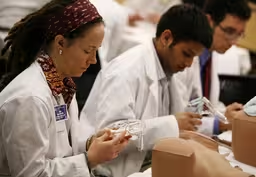
How Robert Smalls sailed to freedom during the Civil War
Clip: 2/11/2023 | 4m 32sVideo has Closed Captions
How Robert Smalls sailed his crew and family to freedom during the Civil War
During the transatlantic slave trade, Charleston, South Carolina was one of the largest slave ports in the United States. But at the height of the Civil War, Charleston’s waterfront was the backdrop of one enslaved man’s daring escape. In part two of our series, “Hidden Histories,” we get the story of Robert Smalls, who stole a Confederate ship and sailed to freedom.
Problems playing video? | Closed Captioning Feedback
Problems playing video? | Closed Captioning Feedback
Major corporate funding for the PBS News Hour is provided by BDO, BNSF, Consumer Cellular, American Cruise Lines, and Raymond James. Funding for the PBS NewsHour Weekend is provided by...

How Robert Smalls sailed to freedom during the Civil War
Clip: 2/11/2023 | 4m 32sVideo has Closed Captions
During the transatlantic slave trade, Charleston, South Carolina was one of the largest slave ports in the United States. But at the height of the Civil War, Charleston’s waterfront was the backdrop of one enslaved man’s daring escape. In part two of our series, “Hidden Histories,” we get the story of Robert Smalls, who stole a Confederate ship and sailed to freedom.
Problems playing video? | Closed Captioning Feedback
How to Watch PBS News Hour
PBS News Hour is available to stream on pbs.org and the free PBS App, available on iPhone, Apple TV, Android TV, Android smartphones, Amazon Fire TV, Amazon Fire Tablet, Roku, Samsung Smart TV, and Vizio.
Providing Support for PBS.org
Learn Moreabout PBS online sponsorshipFinally tonight, we bring you part two of our series, Hidden Histories.
During the transatlantic slave trade, Charleston, South Carolina, was one of the largest slave ports in the United States.
More than 150,000 enslaved Africans passed through Charleston at the height of the Civil War, though, Charleston's waterfront was the backdrop for one man's escape to freedom.
Robert Smalls may have been raised on a Buford South Carolina plantation, but he soon discovered he was at home on the water.
Jermaine Fowler is the author of the Humanity archive.
JERMAINE FOWLER, Author, "The Humanity Archive": Twelve years old, Small's mother requests that he go to work at the bustling docks of the Charleston harbor, and he takes to the water like a fish.
He works as a long shoreman.
He works as a rigor.
He works as a sailmaker.
JOHN YANG: During the Civil War, Smalls, who was enslaved, was conscripted into the Confederate army and put to work as the pilot of the planter, a side wheel steamer.
Nancy Tolson is the Assistant Director of African American Studies at the University of South Carolina.
NANCY TOLSON, University of South Carolina: It was for cotton and other goods that would be going throughout the Charleston harbor.
When the war broke out, the confederates took over the planter and made it into a warship.
They weaponized it with cannons and ammunition, and now it became a cargo ship of weapons to be dropped off at different forts and different places along the Charleston harbor.
JOHN YANG: Smalls was forced to work on a ship for the forces fighting to keep him enslaved.
But he had an idea.
JERMAINE FOWLER: He sees this opportunity for freedom and kind of start formulating his plan there to escape.
JOHN YANG: The planter would tie up at the dock in Charleston at the end of each day, its three officers would go ashore to spend the night in their homes, leaving the enslaved crew of seven on board alone.
In the early morning hours of May 13, 1862, Smalls sense the time was right, with only his fellow crew members aboard, he ordered the steamer to leave.
NANCY TOLSON: Robert Smalls and the men on the planter, the enslaved men, they said that this was a do or die mission.
They weren't turning back because they knew they would be executed if they did.
JOHN YANG: Smalls first stop a wharf where his family and those of his crewmates were hiding in another boat.
NANCY TOLSON: Robert Smalls, as the pilot was staring the ship, and they were going to each pass at each fort, with the correct signals, with the correct whistles, Robert Smalls will put on the captain's hat and even the captain's stand, you know, to convince each one of the ports that we're looking at them, that this is who it was.
JOHN YANG: They steamed through the heavily guarded Charleston harbor and passed the Confederate occupied Fort Sumter, where the first shots of the Civil War had been fired just a year earlier.
And tell us about that, escapade.
What happened in that incident?
JERMAINE FOWLER: There was a lot of fear.
There was a lot of trembling, you know, there's a lot of praying, and they actually made it.
They hoisted up a bedsheet for a white flag as they approached the Union Ships.
Crossing into Union held waters, the 16 people aboard were free from slavery for the first time in their lives.
Smalls triumphantly delivered the planter to the captain of a Union ship.
JOHN YANG: And it also got some attention in the press at the time, didn't it?
JERMAINE FOWLER: Yeah.
So, in the press, the northern newspapers, they called Smalls a hero.
This is unheard of.
It's a feat.
The Southern newspapers, though, they were not happy at all.
They were wondering how this slave could take one of their ships.
NANCY TOLSON: He became this legend.
He became part of folklore that, it seemed for me, kind of dissolved somewhere along the way.
He was truly an American hero and one of the people that just does not get enough credit pertaining to the Civil War.
JOHN YANG: Smalls received a $1500 reward for turning the planter over to Union forces.
He spent part of it to buy the home in Buford where he and his mother had been enslaved.
Next week, we'll continue our Hidden History series with the story of Philip Reed, an enslaved sculptor who helped create the statue atop the Capitol dome.
Deadly quake leaves millions without homes in Turkey, Syria
Video has Closed Captions
Clip: 2/11/2023 | 3m 19s | Deadly earthquake in Turkey and Syria leaves millions without homes (3m 19s)
News Wrap: U.S. searches for object shot down near Alaska
Video has Closed Captions
Clip: 2/11/2023 | 2m 10s | News Wrap: U.S. military searches for object shot down near Alaska (2m 10s)
Two Black QBs are starting in the Super Bowl. Why it matters
Video has Closed Captions
Clip: 2/11/2023 | 6m 7s | Doug Williams on the significance of 2 Black quarterbacks in the Super Bowl (6m 7s)
Why more states are requiring consent for pelvic exams
Video has Closed Captions
Clip: 2/11/2023 | 6m 33s | Why more states are requiring consent for pelvic exams on unconscious patients (6m 33s)
Providing Support for PBS.org
Learn Moreabout PBS online sponsorship
- News and Public Affairs

FRONTLINE is investigative journalism that questions, explains and changes our world.

- News and Public Affairs

Amanpour and Company features conversations with leaders and decision makers.












Support for PBS provided by:
Major corporate funding for the PBS News Hour is provided by BDO, BNSF, Consumer Cellular, American Cruise Lines, and Raymond James. Funding for the PBS NewsHour Weekend is provided by...




